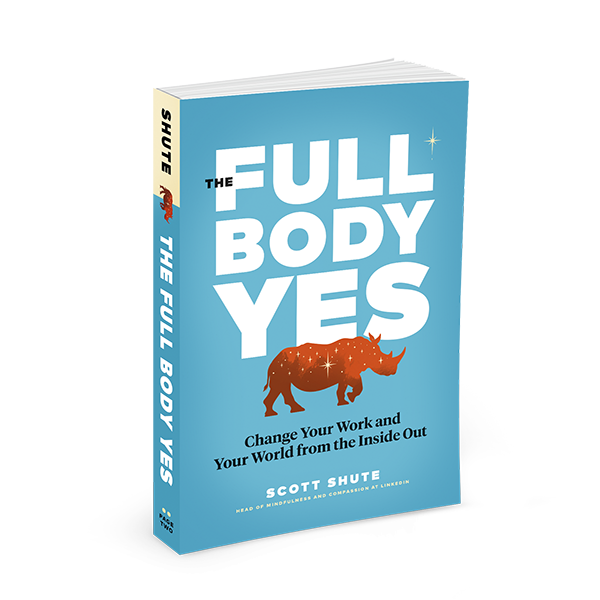’As the Individual Evolves, the Company Evolves’: LinkedIn’s Scott Shute on Cultivating Compassion in the Workplace

Scott Shute is LinkedIn’s head of mindfulness and compassion programs — a unique title if ever there was one.
Just reading that sentence, you might start to wonder why LinkedIn would have such a “squishy” position on staff. After all, LinkedIn is a professional networking site, a venue for finding jobs, making deals, and keeping tabs on your industry. How do things like “mindfulness” and “compassion” fit into that picture?
Read Shute’s forthcoming book, The Full Body Yes: Change Your Work and Your World From the Inside Out, and you might start to wonder why every company doesn’t have its own head of mindfulness and compassion.
Grounded in startlingly honest stories from Shute’s own life, The Full Body Yes is not your average career handbook. It’s less about corporate politics and strategy sessions than it is about self-knowledge and self-love — concepts that get little if any airtime in a typical office. But as Shute convincingly argues, employees who know and love themselves are employees who nurture themselves. They’re employees who make the right career decisions and join companies that mean something to them. They’re employees who love coming to work, love the work they do, and love striving to help the company bring its vision to fruition.
And maybe the other social networking sites could learn a thing or two from LinkedIn, which doesn’t seem to be plagued by the same kind of wild disinformation and outright cruelty that have made Twitter and Facebook troll-haunted quagmires. Is that because, with Shute’s help, LinkedIn cultivates mindfulness and compassion among employees, which then radiates outward into the site’s very structure and operations? Maybe, maybe not.
What is certain is that The Full Body Yes can teach you a thing or two about finding fulfillment at work, whether you’re a front-line employee or overseeing it all from the corner office. For a taste of what you can find in the book, check out our interview with Shute below:
Recruiter.com: On the book’s very first page, you make a frank — but true! — assertion: “Somehow over the years we’ve gotten into this strange pattern of thinking about work as ‘bad’ and the rest of our lives as ‘good.'” I wondered if you had any thoughts about how this mindset came to pass — and became so common?
Scott Shute: I think this attitude was born from the days when working conditions weren’t great. There was more physical labor, and workers didn’t have many choices. They had to work to provide for their families. That was the bargain, trading our time for money. It often wasn’t particularly enjoyable. It was a job.
As we’ve evolved from the Agrarian and Industrial Ages to the Information Age, the landscape is different. From an employee perspective, we have more choices. From an employer’s perspective, companies realize that their most important asset is their people. It’s pretty clear that it makes great business sense to treat our employees like the precious asset they are.
But still, our internal attitudes toward work remain the same, and it’s up to us as individuals to make that attitude shift. We can move away from thinking about what we have to do and instead focus on what we’re choosing to do or even what we get to do.
RC:That attitude shift can help us find fulfillment at work — which brings us to the “full body yes” of the book’s title. What is a “full body yes”?
SS: The full body yes is when we’re completed aligned internally, when we know that something is right for us.
It’s especially poignant when we’ve been searching for an answer, struggling with something, and we finally feel it. We know in our bones when something feels right. We can use this feeling as a filter for making decisions about our careers. With each career choice, we can move closer and closer to that place within ourselves where we feel aligned.

RC:The book stresses the importance of coming to both know and love yourself. How are self-knowledge and self-love important from a career perspective? How do they fit into the equation of finding fulfillment at work?
SS:When we know ourselves, we have a better understanding of why we make decisions and what our deeply held values are. As our own self-knowledge matures, we are able to make better decisions about our lives and our work. For instance, we don’t take jobs that would make us (or our loved ones) miserable just because they might yield a higher paycheck or title.
Self-love goes further. Beyond just the self-knowing, we can recognize and appreciate that deepest part of ourselves and ensure it has a voice. When we understand what’s absolutely most important to us, we can nurture that part of ourselves. We end up making both big and small decisions about our work that will leave us much more fulfilled than if we were reacting to life and going with the flow of what we think other people want us to do.
RC:As much as the book stresses the importance of self-knowledge and self-love, it also stresses the importance of coming to understand the many “systems” — “our family, our schools, our churches, our society” — in which we are embroiled every day. Can you say a little more about how coming to understand these systems can help us find fulfillment at work?
SS:When we understand how we’re making decisions and who we’re trying to please, it gives us choice. Happiness and contentment are inside jobs. When we look to others for external validation, it’s often a race we can never win. This requires a deep sense of self and strong conviction in one’s own values. This is really where the self-love is needed. When we’re clear on who we are, what we need, and how those things intertwine with the rest of our lives, we’ll make choices that leave us more fulfilled.
RC:This doesn’t read like your average career advice book — and I say that as a compliment. It’s full of personal stories, written with a very reflective tone. It dives deep into ideas of self-knowledge, self-worth, and interconnectedness.
In many ways, it’s more about mindfulness and compassion than it is about work — but that’s the point, isn’t it? I wondered if you could say a bit about the choice to take this approach to the topic and a bit about why mindfulness and compassion are important in the workplace?
SS:Thanks for that. I wrote it as a journey of self-exploration, using my own life stories to inform the narrative. These are the stories of all of us, how we’re searching for deeper meaning in our lives. Many of the stories just happen to be in a work context. The work context is just another place to learn these life lessons.
We can think of mindfulness as awareness, and each of us is on our own journey of building that awareness. Compassion is how we interact and live with each other. In that way, mindfulness and compassion are intertwined. As we grow our individual awareness, we’re able to be more compassionate. We’re able to be of greater service to the world.
It turns out that the growth and development of an individual on our path to maturity is very similar to a company’s evolution. We move away from selfish, reactionary behavior to behavior benefitting the larger community. As the individual evolves, the company evolves. And together, we can change work (and the world) from the inside out.

